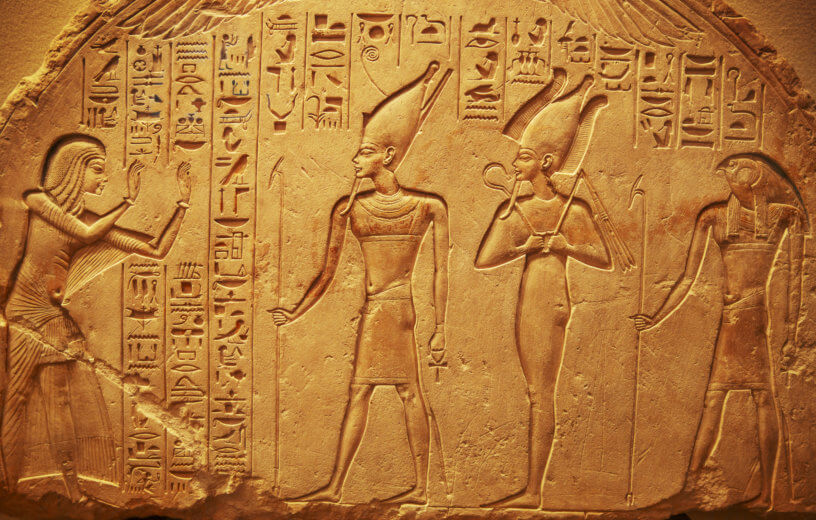AURORA, Colo. — Humanity has always been interested in discovering our past, and while historians and scholars have uncovered a great deal of mankind’s time on this planet, the fact remains that there is still very much we just don’t know. Entire cities and civilizations remain swept away by the hands of time. In many scenarios, historians must do a great deal of guesswork in order to piece together events and people that transpired or lived thousands of years ago, which invariably means that errors are going to happen. Now, one researcher from the University of Colorado says he has uncovered one such mistake. According to Jakub Kwiecinski, PhD, the ancient Egyptian widely considered to be the first ever female doctor, Merit Ptah, never existed.
Now, that doesn’t mean the first female doctor wasn’t an ancient Egyptian, but her name wasn’t Merit Ptah.
“Almost like a detective, I had to trace back her story, following every lead, to discover how it all began and who invented Merit Ptah,” Kwiecinski, an instructor in the CU School of Medicine Department of Immunology and Microbiology and a medical historian, explains in a release.
“Merit Ptah was everywhere. In online posts about women in STEM, in computer games, in popular history books, there’s even a crater on Venus named after her,” he continues. “And yet, with all these mentions, there was no proof that she really existed. It soon became clear that there had been no ancient Egyptian woman physician called Merit Ptah.”
As Kwiecinski continued digging into Ptah’s origins, he says he uncovered a case of mistaken identity that has persisted for decades in large part because people simply wanted to believe it was true.
Merit Ptah is first mentioned in the 1930s by Kate Campbell Hurd-Mead, a medical historian who at the time had set out to write a complete historical timeline of women in the field of medicine. Her book on the subject was ultimately published in 1938. In that book, she writes of a tomb excavation in Egypt’s Valley of the Kings where archeologists discovered a “picture of a woman doctor named Merit Ptah, the mother of a high priest, who is calling her `the Chief Physician.'”
However, despite this account in Hurd-Mead’s book, Kwiecinski says there is no actual historic record of a person with that name serving as a physician.
“Merit Ptah as a name existed in the Old Kingdom, but does not appear in any of the collated lists of ancient Egyptian healers – not even as one of the `legendary’; or `controversial cases,” he explains. “She is also absent from the list of Old Kingdom women administrators. No Old Kingdom tombs are present in the Valley of the Kings, where the story places Merit Ptah’s son, and only a handful of such tombs exist in the larger area, the Theban Necropolis.”
For reference, Egypt’s Old Kingdom existed between 2575 and 2150 BC.
Here’s where the story gets even more interesting: Kwiecinski has uncovered another ancient Egyptian woman who he believes actually was the first female doctor. Around 1930, an excavation in Giza unearthed the tomb of Akhethetep, an Old Kingdom royal advisor. Within his tomb, a false door was discovered that depicted a woman named Peseshet. Per Egyptian customs around this time, that probably means that Peseshet was Akhethetep’s mother. The depiction of Peseshet found in the tomb describes the woman as the “Overseer of Healer Women.”
So, both Peseshet and Merit Ptah supposedly come from around the same time period, and both women were mentioned within the tomb’s of their high-ranking children. Furthermore, Kwiecinski was able to verify that the discovery of Peseshet was mentioned in various historical books in the 1930s, including one that was read by Hurd-Mead. Thus, Kwiecinski believes Hurd-Mead misidentified Merit Ptah as Peseseth, creating a case of ancient identity theft.
“Unfortunately, Hurd-Mead in her own book accidentally mixed up the name of the ancient healer, as well as the date when she lived, and the location of the tomb,” Kwiecinski says. “And so, from a misunderstood case of an authentic Egyptian woman healer, Peseshet, a seemingly earlier Merit Ptah, `the first woman physician’ was born.”
After Hurd-Mead published her inaccurate depiction of Ptah, the story likely spread quickly among historians and academics eager to believe what had been reported. Kwiecinski compares this to the echo-chamber effect that we are all seeing more and more of these days with fake news being spread online.
“Finally, it was associated with an extremely emotional, partisan – but also deeply personal – issue of equal rights,” he says. “Altogether this created a perfect storm that propelled the story of Merit Ptah into being told over and over again.”
At the end of the day, though, Kwiecinski says the real story here isn’t the true name of ancient Egypt’s first woman doctor. Instead, he believes the legend of Merit Ptah illustrates just how hard women historians have worked to prove that the fields of medicine and science were never exclusively male, even in ancient times.
“So even though Merit Ptah is not an authentic ancient Egyptian woman healer,” he concludes. “She is a very real symbol of the 20th century feministic struggle to write women back into the history books, and to open medicine and STEM to women.”
The study is published in the Journal of the History of Medicine and Allied Sciences.
